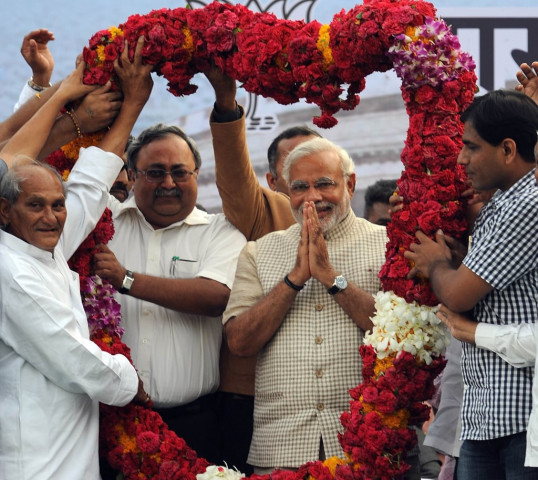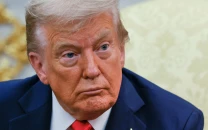Modi’s landslide victory
There is a lot of responsibility on BJP to make sure that minorities are not left behind on BJP’s march to progress.

Chief Minister of western Gujarat state and main opposition Bharatiya Janata Party (BJP) prime ministerial candidate Narendra Modi (2nd R) is garlanded as he arrives at a public rally after his victory in Vadodara on May 16, 2014. PHOTO: AFP
The BJP campaigned heavily on the Congress’s failures to stem corruption and improve India’s ailing economy. It promised to bring jobs, investment, development, infrastructure and schools to all parts of India. But crucially, the BJP promised that Modi would be the man to do it. In Modi, the BJP — and as it turned out Indian voters — found a candidate antithetical to the Congress’s, Rahul Gandhi. Rahul’s father, grandmother, and great-grandfather have all served as India’s prime ministers; Modi is the son of a chaiwallah. Rahul has been prepared to become prime minister since his birth; Modi rose through the ranks of the RSS, and then the BJP, and wrestled power for himself. Rahul is private and camera-shy; Modi is boisterous, confrontational and charismatic.
In fact, this election is as much an endorsement of Modi as it is an indictment of the Congress. Throughout the campaign, the Congress has struggled to distance itself from allegations of corruption, nepotism, and ill-management. Its campaign touting rural and women’s empowerment fell on deaf ears. Despite conceding defeat early in the day, Congress spokespeople struggled to explain the magnitude of its defeat, darkly alluding to media conspiracies and inevitable anti-incumbency. The Congress faces tough decisions and it should introspect. The Nehru-Gandhi dynasty has taken a once-great party and reduced it to a family fiefdom. Party seniors need to consider whether resignations, if not outright dismissals, are in order. The party needs to reinvent itself, its image and the way it does politics.
Beyond the immediate euphoria, Modi’s victory should be met with caution, and not just by Indians. During the campaign, the BJP struck alarming tones in sensitive, riot-hit areas. BJP stalwart Amit Shah issued calls for ‘revenge’ against the Muslim community of Muzaffarnagar district in Uttar Pradesh, which suffered greatly in communal riots last year. Another BJP candidate said that those against Narendra Modi [darkly alluding to Muslims] will have no place in India, but in Pakistan. Despite the inertia, India’s coalition governments at least guaranteed a measure of protection against the whims of the centre. Without any regional parties catering to the interests of minorities like the Dalits and Muslims, and also of backward castes, there is a lot of responsibility on the BJP to make sure that minorities are not left behind on the BJP’s march to progress. While history suggests that there is little reason to believe the BJP will bear this responsibility, one hopes that electoral concern — if not genuine concern — will compel the party to be more considerate towards the vulnerable.
As far as relations with Pakistan are concerned, the Foreign Office has maintained that the government will ‘deal with’ whoever comes into power, and we can now expect Nawaz Sharif to be amenable to working with Modi. Historically, both the BJP and Congress governments have been amenable to, and sceptical of, normalisation, and we are yet to see which the new Indian government shall be. Pakistan also has a lot to learn from India, and from its execution of this paramount exercise of democracy, seamlessly, and without blame and allegations. Hopefully, this is one area where it will choose to emulate its neighbour.
Published in The Express Tribune, May 17th, 2014.
Like Opinion & Editorial on Facebook, follow @ETOpEd on Twitter to receive all updates on all our daily pieces.



















COMMENTS
Comments are moderated and generally will be posted if they are on-topic and not abusive.
For more information, please see our Comments FAQ